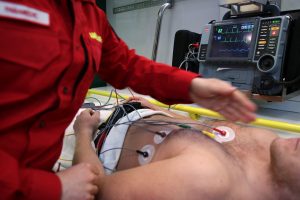What Every Parent MUST Know to Prevent Sudden Death!
An athletic 20-year old man is playing basketball and suddenly collapses on the court and dies.
On a hot July day, a young and vibrant college football player suddenly makes great tackle and never gets up-only to be pronounced dead 5 minutes later.
High School track runner dies after finishing second in a race.
The sad truth is 1 out of 50,000 young adults will fall victim to Sudden Death. Most sudden deaths have been linked to a thickened, enlarged heart called hypertrophic cardiomyopathy (HCM), or by a condition that disturbs the rhythm of the heart called an arrhythmia. So how does this happen?

When one sweats, a significant amount of magnesium is lost. Magnesium is the most under-recognized electrolyte disorder in the U.S. Dr. Mildred Seelig, one of the country’s leading authorities on magnesium suggests that 80%-90% of the population is deficient in magnesium.
It is beyond the extent of this post as to why the public is being denied the truth of the seriousness of magnesium deficiency and sudden death. The amount of medical research could fill a book, but it is unfortunately being ignored.
According to Michael A. Brodsky M.D., associate professor of medicine at the University of Medicine and the director of the Cardiac Arrhythmia Service at the University of California, mineral imbalances interfere with the heart’s normal nerve function.
While most athletes have been conditioned to drink a potassium rich drink after sweating, very few have been educated on the dangers of a magnesium deficiency. Dr. Brodsky states that arrhythmia therapy should focus on replenishing two key minerals: potassium and magnesium.
Almost all physicians have known for some time just how vital potassium is for normal heartbeat.
Magnesium is an entirely different story, however. According to Carla Sueta M.D., Ph.D., assistant professor of medicine and cardiology at the University of North Carolina at Chapel Hill School of Medicine “apparently, many doctors still don’t realize how important a role this mineral can play in some heart patients.
In fact, most never check the magnesium level. She has shown through her research that magnesium reduced the incidence of several types of ventricular arrhythmia by 53 to 76 percent.
Magnesium deficiency can be induced by the very drugs meant to help heart problems. Some types of diuretics (water pills) cause the body to excrete both magnesium and potassium, as does digitalis.
And magnesium deficiency is often at the bottom of what’s called refractory potassium deficiency. The amount of magnesium in the body determines the amount of a particular enzyme that determines the amount of potassium in the body,” he explains. So if you are magnesium-deficient, you may in turn be potassium-deficient, and no amount of potassium is going to correct this unless you are also getting enough magnesium. This becomes a veritable “ticking time bomb” when considering the fact that many young athletes play multiple sports with very little, if any, nutritional support for the demands put upon their body.
The Best Test to Determine Your Level of Magnesium
Although most physicians rarely check this important mineral, the few that do usually rely on test called Serum Magnesium. Unfortunately, this test only measures approximately 1% of the magnesium in your body- a poor test at best. The “Gold Standard” and the most accurate test is the red blood cell (RBC) elements test.
This test examines the levels of twelve minerals and six toxic heavy metals. The erythrocyte is the red blood cell that floats in our serum to carry oxygen to our cells.
The minerals this test analyzes from inside of the red blood cell includes magnesium, calcium, copper, potassium, selenium, and zinc.
doctorsdata.com/Red-Blood-Cell-Elements
Common Symptoms of Magnesium Deficiency
The most common symptoms include back and neck pain, muscle spasms, anxiety, panic disorders, Raynaud’s spastic vessels, arrhythmia, fatigue, eye twitches, vertigo, migraines. These would be “red flags” if observed in the athlete or in any other individual for that matter.
Best Sources of Magnesium
The best way of ensuring enough magnesium is to eat a variety of whole foods, including whole grains, nuts, seeds, and vegetables, preferably food grown on naturally composted soil. The green color of green vegetables is due to chlorophyll, which is a molecule that contains magnesium. Avoid refined processed foods, especially white sugar and white flour products, as most magnesium is removed from them.
Here’s a side note then. If you are suffering with a heart problem and have not had your magnesium checked, then I want to urge you to have your physician order the two tests I listed above. Unless you have proof that your magnesium is within normal levels, please realize that you are playing with your health! After all, the goal is to enjoy “the best performance of your life!”
God bless,
DrB
References:
Eisenberg MJ, Magnesium deficiency and sudden death (editorial), AM Heart J 1992 Aug; 124(2):544-9
Magnes Res 1994 Jun;7(2):145-53
Tzivoni, Dan, M.D. and Keren, Andre, M.D., “Suppression of Ventricular Arrhythmias by Magnesium”, The American Journal of Cardiology, June 1, 1990;65:1397-1399.
Miner Electrolyte Metab 1993;19(4-5):323-36
Keller, Peter K. and Aronson, Ronald S., “The Role of Magnesium in Cardiac Arrhythmias”, Progress in Cardiovascular Diseases, May/June 1990;32(6):433-448.
Biochim Biophys Acta 1993 Oct 20;1182(3):329-32
Biochim Biophys Acta 1994 Jan 11;1225(2):158-64
Practical Briefings: Clinical News You Can Put into Your Practice Now. Ventricular Arrhythmias and Magnesium”, Patient Care, October 15, 1990;16-20
Magnes Res 1993 Jun;6(2):191-2
Hennekens (1987) Epidemiology Medicine, p.54-98
Schriftenr Ver Wasser Boden Lufthyg 1993;88:474-90
Am J Cardiol 1992 Oct 8;70(10):44C-49C
Fiziol Zh SSSR Im I M Sechenova 1992 Jul;78(7):71-7



